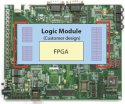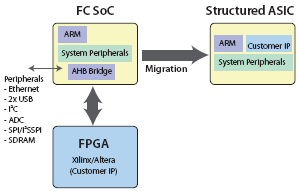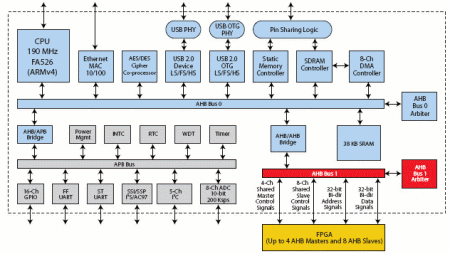Kit eases ASIC development for ARM/Linux systems
Feb 16, 2007 — by LinuxDevices Staff — from the LinuxDevices Archive — 9 views Faraday Technology Corporation (FTC) is shipping a development platform aimed at simplifying the development of ARM-based structured ASICs (application-specific integrated circuits) for embedded devices. The “FPGACompanion” platform comprises an ARM-based SoC (system-on-chip) and evaluation board, along with a Linux 2.6.14 BSP (board support package) and tools.
Faraday Technology Corporation (FTC) is shipping a development platform aimed at simplifying the development of ARM-based structured ASICs (application-specific integrated circuits) for embedded devices. The “FPGACompanion” platform comprises an ARM-based SoC (system-on-chip) and evaluation board, along with a Linux 2.6.14 BSP (board support package) and tools.
(Click for larger view of FPGACompanion evaluation board)
Faraday says that while ARM is the most common architecture for ASICs and SoCs, development teams typically perform system-level design verification on x86, PowerPC, or MIPS, because devices are available on these architectures that interface easily with FPGAs. The company hopes its FPGACompanion ensemble will save such teams the effort of porting their software, by providing an ARM-based development platform that, along with custom logic implemented on an FPGA, can provide an initial sampling vehicle.

Faraday FPGACompanion SoC intended use
The FPGACompanion SoC is based on a 190MHz version of Faraday's FA526 core, a 32-bit general purpose RISC core based on the ARMv4 ISA (instruction set architecture). The FA526 features an AMBA 2.0 AHB bus architecture, and the FPGACompanion SoC integrates an AHB bridge and transaction header for external FPGA connectivity.

Faraday FPGACompanion SoC function diagram
(Click to enlarge)
Additional touted FPGACompanion development platform features include:
- 10/100 Ethernet MAC subsystem
- 2x USB 2.0 OTG and USB 2.0 device controllers with integrated PHY
- 8-channel 200 kSPS ADC
- SDRAM Controller (SDMC)
- Static Memory Controller (SMC)
- AES-DES Cipher Coprocessor (AES)
- 100 MHz (1/2 system clock) external 32-bit AHB header for direct connectivity to external FPGAs
- Claimed 1 watt power dissipation at 190 MHz CPU operation
- UMC 0.18 Aum process
- 484-pin PBGA 23 x 23 mm2 package
- Hardware and software evaluation board (EVB) and documentation
Additionally, the FPGACompanion development platform is architecturally compatible with Faraday's Peripheral Composer-1 structured ASIC development kit, the company says.
VP of marketing Christopher Moezzi stated, “Today's service provider-based deployments really mean a three-stage rollout for our customers: prototype/field trials, small quantity deployments, followed by full-volume production.”
Availability
The FPGACompanion platform is available now, priced at $6,000, which includes the EVB, software, tools, and documentation. The platform includes a Linux 2.6.14-based software reference design that supports all I/Os, and can be modified or used as-is in customer designs, the company says.
It has been sampled at several customer sites, the company says.
Faraday is a fabless ASIC vendor that also sells silicon IP (intellectual property). Based in Taiwan, with offices in the U.S., Asia, and Europe, it employs about 700 and reported 2006 revenues of $171M, it says.
This article was originally published on LinuxDevices.com and has been donated to the open source community by QuinStreet Inc. Please visit LinuxToday.com for up-to-date news and articles about Linux and open source.